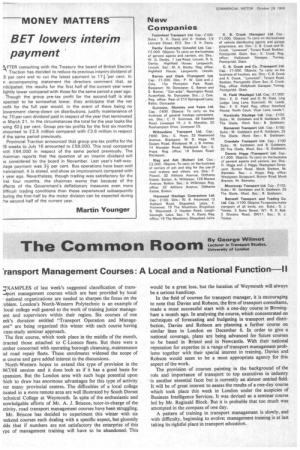'ransport Management Courses: A Local and a National Function—II
Page 74

If you've noticed an error in this article please click here to report it so we can fix it.
"XAMPLES of last week's suggested classification of trans-1 —dport management courses which are best provided by local
national organizations are needed to sharpen the focus on the -oblem. London's North-Western Polytechnic is an example of local college well geared to the work of training junior manageent and supervisors within their region. Six courses of one eek's duration entitled "Transport Operation and Manageent" are being organized this winter with each course having case-study seminar approach.
The first course, which took place in the middle of the month, tracted those attached to C-Licence fleets. But there were a umber concerned with operating borough cleansing, maintenance rid road repair fleets. These enrolments widened the scope of Le course and gave added interest to the discussions.
North-Western hopes to extend this type of provision in the 967/68 session and it does look as if it has a good basis for cpansion. But the London area with such huge potential upon 'hich to draw has enormous advantages for this type of activity ver many provincial centres. The difficulties of a local college tuated in a more remote area are well illustrated by South Dorset 'echnical College at Weymouth. In spite of the enthusiastic and nowledgable efforts of Mr. A. J. Briscoe, tutor-in-charge of the ctivity, road transport management courses have been struggling. Mr. Briscoe has decided to experiment this winter with six reekend courses each dealing with a specific aspect, but gloomily dds that if numbers are not satisfactory the enterprise of this ype of management training will have to be abandoned. This
would be a great loss, but the location of Weymouth will always be a serious handicap.
In the field of courses for transport manager, it is encouraging to note that Davies and Robson, the firm of transport consultants, made a most successful start with a one-day course in Birmingham a month ago. In analysing the course, which concentrated on techniques of forecasting and budgeting in transport and distribution, Davies and Robson are planning a further course on similar lines in London on December 6. In order to give a national coverage, plans are being advanced for future courses to be based in Bristol and in Newcastle. With their national reputation for expertise in a range of transport management problems together with their special interest in training, Davies and Robson would seem to be a most appropriate agency for this aspect of the work. The provision of courses painting in the background of the role and importance of transport to top executives in industry • is another essential facet but is currently an almost untried field. It will be of great interest to assess the results of a one-day course which took place this week in London under the auspicies of Business Intelligence Services. It was devised as a seminar course led by Mr. Reginald Block. But it is probable that too much was attempted in the compass of one day. A pattern of training in transport management is slowly, and with difficulty, beginning to evolve; management training is at last taking its rightful place in transport education.
























































































































